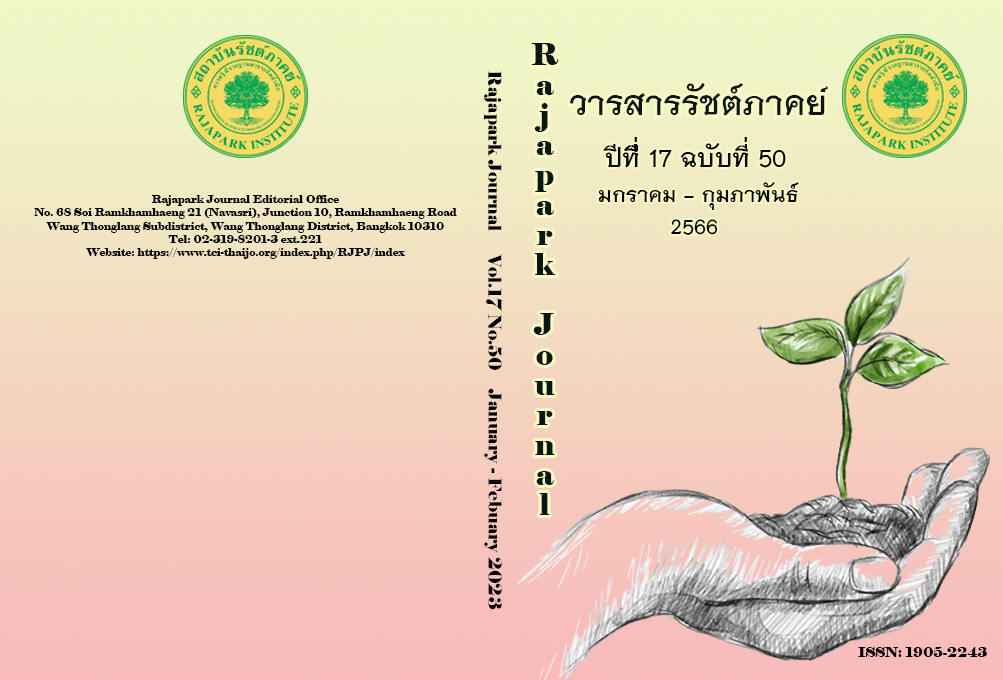The Relationship and Influences of Political Knowledge, Political Ideology, Political Trust and Political Participation on Youth Voting in Thailand
Main Article Content
Abstract
The objective was to study the relationship and influence of political ideology, political knowledge, political trust, and political participation on youth voting. The researcher developed a questionnaire from a literature review and collected responses from 440 eligible voters in Thailand. The data was then analyzed by correlation analysis and multiple regression analysis. It was found that political ideology, political knowledge, political trust, and political participation positively related significantly at .01 level. Political trust and political participation also relate significantly to voting. In addition, political knowledge and political trust combined have predictive influences on voting significantly (Sig .05) and their influence coefficients of .28 and .32 respectively.
Article Details

This work is licensed under a Creative Commons Attribution-NonCommercial-NoDerivatives 4.0 International License.
Views and opinions appearing in the Journal it is the responsibility of the author of the article, and does not constitute the view and responsibility of the editorial team.
References
Almond, G., & Verba, S. (2015). The Civic Culture Revisited. Little, Brown.
Anderson, T. (2015). Seeking internationalization: The state of Canadian higher education. Canadian Journal of Higher Education, 45(3), 166-187. DOI: 10.47678/cjhe.v45i4.184690
Azevedo, E.P., Pomeranz, L., Cheng, J., Schneeberger, M., Vaughan, R., Stern, S.A., Tan, B., Doerig, K., Greengard, P., & Friedman, J.M. (2019). A Role of Drd2 Hippocampal Neurons in Context-Dependent Food Intake. Neuron, 102(4), 873-886. https://doi.org/10.1016/j.neuron.2019.03.011
Chanasith, K., & Pasunon, P. (2018). Sampling And Integration Based on Mixed Methods Research. Journal of Humanities and Social Sciences Thonburi University,12(29), 147-158.
Chen, D. (2017). Facilitating Public Service Provision: The Emerging Role of Municipal Television News in China. The China Quarterly, 229, 130-149. DOI: https://doi.org/10.1017/S0305741016001545
Choma, B., & Hafer, C.L. (2009). Understanding The Relation Between Explicitly and Implicitly Measured Political Orientation: The Moderating Role of Political Sophistication. Personality and Individual Differences, 47(8), 964-967.
Dragan, I-M., & Isaic-Maniu, M. (2013). Snowball Sampling Completion. Journal of Studies in Social Sciences, 5(2), 160-177. https://core.ac.uk/download/pdf/229607586.pdf
Delli, M.X., & Keeter, S. (1997). What Americans Know about Politics and Why It Matters. Yale University.
Fukuyama, F. (2015). Why Is Democracy Performing So Poorly?. Journal of Democracy, 26(1), 11-20. DOI: 10.1353/jod.2015.0017
Esarey, E., Schroeder, C.B., & Leemans, W.P. (2009). Physics of Laser-Driven Plasma-Based Electron Accelerators. Reviews of Modern Physics, 81(3), 1229. https://journals.aps.org /rmp/abstract/10.1103/RevModPhys.81.1229
Feldman, T., Mauri, L., & Kahwash, R. (2018). Trans Catheter Interatrial Shunt Device for The Treatment of Heart Failure with Preserved Ejection Fraction (REDUCE LAPHF I [Reduce Elevated Left Atrial Pressure in Patients with Heart Failure]): A Phase 2, Randomized, Sham-Controlled Trial. Circulation, 137(4), 364-375.
Gerber, A., Donald, G., & Shachar, R. (2003). Voting May Be Habit-Forming: Evidence from a Randomized Field Experiment. American Journal of Political Science, 4(3), 540-550. DOI: 10.1111/1540-5907.00038
Hetherington, M.J. (1998). The Political Relevance of Political Trust. Carrington American Political Science Review, 92(4), 791-808. https://doi.org/10.2307/2586304
Holt, B., Jean-Philippe, L., Borregaard, M.K., & Fritz, S.A. (2013). An Update of Wallace’s Zoogeographic Regions of the World. Science, 339(6115), 74-78. DOI: 10.1126/science.1228282
Li, L. (2004). Political Trust in Rural China. Article Information, 30(2), 228-258. http://www.jstor.org/stable/3181342
Liviatan, I., & Jost, J.T. (2011). System Justification: A Motivational Process with Implications for Social Conflict. Justice and Conflicts. Springer.
Louie, A.V., Granton, P.V., & Fairchild, A. (2022). Palliative Radiation for Advanced Central Lung Tumors with Intentional Avoidance of the Esophagus (PROACTIVE). A Phase 3 Randomized Clinical Trial. JAMA Oncol, 8(4), 1-7. DOI: 10.1001/jamaoncol.2021.7664
Marien, S., & Kern, A. (2018). The Winner Takes It All: Revisiting the Effect of Direct Democracy on Citizens’ Political Support. Political Behavior, 40(4), 857-882. https://www.jstor.org/stable/48694152
Miller, S.R. (1979). Children’s Fears: A Review of The Literature with Implications for Nursing Research and Practice. Nursing Research, 28(4), 217-223. https://europepmc.org/article/med/255919
Molm, L.D., Takahashi, N., & Peterson, G. (2000). Risk and Trust in Social Exchange: An Experimental Test of a Classical Proposition. American Journal of Sociology, 105(5), 1396-1427. https://doi.org/10.1086/210434
Norris, S. (2004). Analyzing Multimodal Interaction: A Methodological Framework. Routledge.
Penley, J.A., & Tomaka, J. (2002). Associations Among the Big Five, Emotional Responses and Coping with Acute Stress. Personality and Individual Differences, 32(7), 1215–1128. https://doi.org/10.1016/S0191-8869(01)00087-3
Pootrakul, P. (2015). Determinants of Selective Exposure that Influence Political Tolerance among Students in Thai Universities. Dhurakij Pundit Communication Arts Journal, 9(1), 53-77.
Rathachatranon, W. (2019). Determining an Appropriate Sample Size for Social Science Research: The Myth of using Taro Yamane and Krejcie & Morgan Method. Kasetsart University Political Science Review Journal, 6(1), 27-58.
Rattanamanee, N., & Phasunon, P. (2019). Response Rate in Quantitative Research. Journal of Humanities and Social Sciences Thonburi University, 13(3), 181-188. https://www.thonburi-u.ac.th/Journal/Document/13-3/Journal13_3_16.pdf
Rodthong, R. (2022). Development Strategies for Online Learning of The Royal Thai Army Branch Schools. Journal of Educational Management and Research Innovation, 4(1), 65–76.
Sargent, T.L. (2009). Contemporary Political Ideologies: A Comparative Analysis (14th ed.). Wadsworth, Cengage Learning.
Sawangwong, B., & Suksamran, S. (2022). Development Process and Retreat of Democracy in Thailand, South Korea, and Myanmar. Journal of Arts Management, 6(1), 175–189. https://so02.tci-thaijo.org/index.php/jam/article/view/251694
Shino, E., & Smith, D. (2020). Political Knowledge and Convenience Voting. Journal of Elections, Public Opinion and Parties, 32(2), 408-428. https://doi.org/10.1080/17457289.2020. 1814308
Wang, R., Balkanski, Y., Boucher, O., Ciais, P., Schuster, G. L., Chevallier, F., & Tao, S. (2016). Estimation of Global Black Carbon Direct Radiative Forcing and Its Uncertainty Constrained by Observations. Journal of Geophysical Research, 121(10), 5948-5971. https://doi.org/10.1002/2015JD024326
Yang, K., & Holzer, M. (2016). The Performance-Trust Link: Implications for Performance Measurement. Public Administration Review, 66(1), 114-126. DOI:10.1111/j.1540-6210.2006.00560.x


